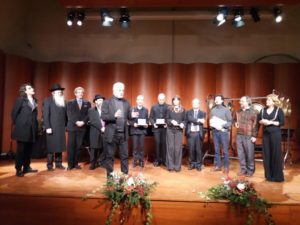CULTURE Jewish Music Celebration with the UCEI Contest in Parma
Amid applause from the public in the Casa della Musica (Music House) of Parma, the top prize of the first edition of the “Concorso di composizione musicale nella tradizione ebraica” (Musical Composition in Jewish Tradition Contest) went to the piece ‘Shirah’ of composer Luka Lodi. The contest was organized by the Union of the Italian Jewish Communities (UCEI) in cooperation with Parma OperArt and under the artistic direction of conductor Riccardo Joshua Moretti, drawing musicians from all over Europe and Israel. It ended yesterday, in a very significant moment for the Jewish world: the kindling of the first Hanukkah light that inaugurated the last phase of the contest, dedicated to the fifty years since Jerusalem unification, with the participation of UCEI President Noemi Di Segni, UCEI board member of culture David Meghnagi and rav David Sciunnach. Giorgio Yehuda Giavarini, President of the Jewish Community of Parma, welcomed the visitors and publicly lit the first light of the Hanukkiah.
It was then time to listen to some music, with the performances of the four finalists: besides the winner, Alexis Cielsa from France, and Francesco Melani and Gianmartino Durighello from Italy. All of their compositions, like Mister Moretti said, were excellent. At the end, Lodi – composer, pianist and conductor born in Shköder, Albania, in 1980 – won with his ‘Shirah’ (which means “singing” in Hebrew). Lodi explained: “The viola has a key role in this composition: it’s kind of a hidden instrument, but it is very expressive. This composition is intended to be a song of grief but at the same time an explosive and determined reaction, just like the age-old history of the Jews, who always knew how to react to the suffering they endured.”
The scores of all the four compositions were played by the Orchestra Filarmonica Italiana, with its sixteen soloists, in the Concert Hall of the Casa della Musica (Music House). Mister Moretti, referring to the theme of this successful first edition, said: “This first edition was able to fully define the spirit of the initiative, bringing to our attention compositions of musicians from many European countries and from Israel, who dedicated their pieces to the Jewish tradition and especially to the city of Jerusalem”. He then added: “These aspects were elaborated in a more effective way by the Albanian Luka Lodi, winner of the First Prize, who presented a composition for solo Viola and Strings called ‘Shirah’. A piece full of lyricism that was able to create the melancholic pathos typical of Jewish music.”
The runner-up was the French composer and clarinettist Alexis Cielsa, who played the piece “Shotns un likht” for clarinet, flute, violin, alto and tenor sax, and double bass. Francesco Melani, young composer from Parma whose composition ‘A song of ascents. Of David’ was inspired by Psalm 122 and Gianmartino Durighello, composer with an extensive experience regarding the bond between Jewish culture and music who presented his composition “Simchat Yerushalaim”, tied for third place.
Lodi and Cielsa also received two precious lithographs by painter Eva Fischer, that were donated and personally given by Alan Baumann, from the Baumann and Fischer Archive.
President Di Segni stated: “Tonight we celebrate the first night of Hanukkah, a Jewish holiday, but its deep message has no borders. And through the music we celebrate Jerusalem. This city is in all our hearts, it has been for more than three thousand years, it is the city with no borders that everyone can feel as their own, dream of, live, and visit tonight through the experience of music. A strong identity dimension of the Jewish culture, in every place and in every phase of our history. The expressions, the instruments, the melodies, the reflection of our existence. Hanukkah and Jerusalem, two space-time dimensions of religious freedom, freedom to be and to live”. These were the aspects that inspired the composers, who had the opportunity to play in one of the cities considered a symbol of music: Parma, “an emblematic place for its musical history, from Verdi to Toscanini”, pointed out Moretti. It was then president Giavarini who talked about Parma and its small but lively Jewish community. He also mentioned the meaning of Hanukkah, which shows that “our hope is never lost” and that “darkness will not prevail over light”.
At the end of the event, President Di Segni together with Mister Giavarini met some members of the Jewish Community of Parma.
Translated by Sara Volpe, student at the Advanced School for Interpreters and Translators of Trieste University, intern at the newspaper office of the Union of the Italian Jewish Communities.

